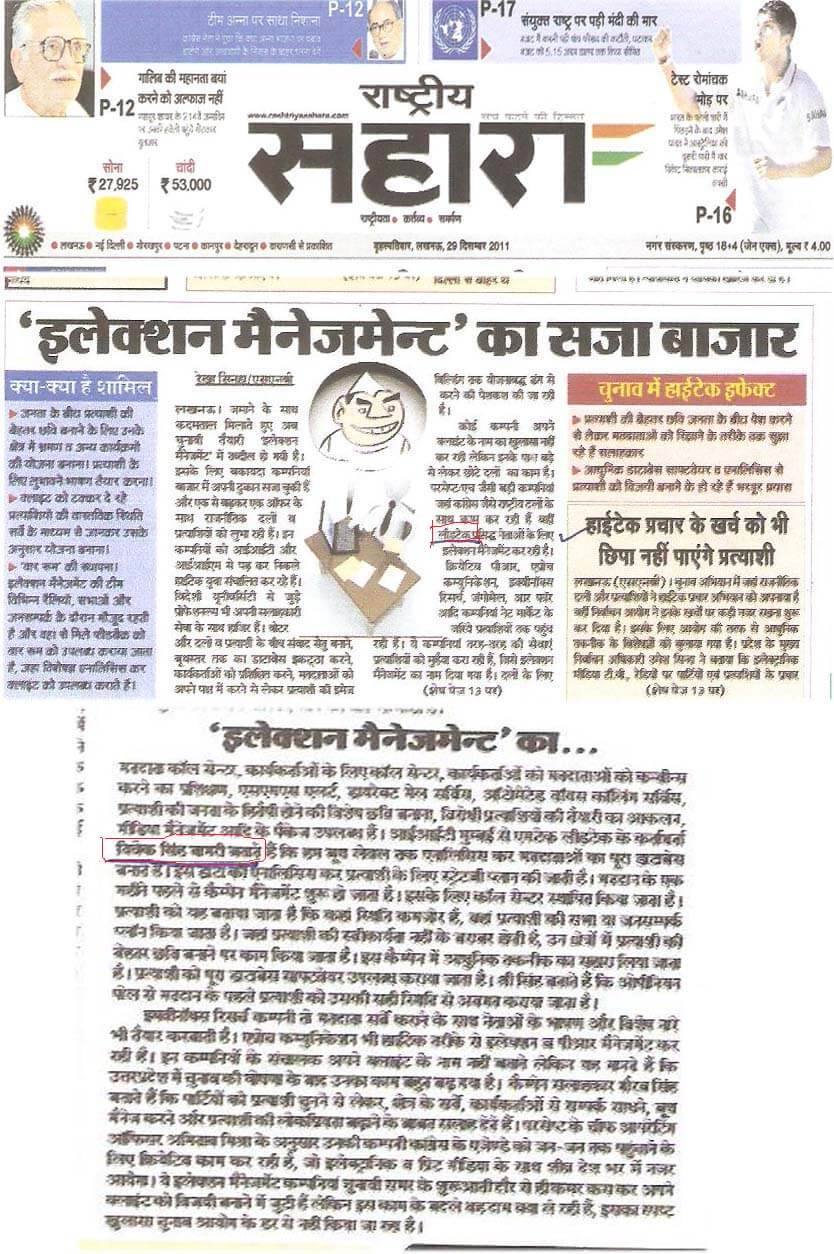3. ‘इलेक्शन मैनेजमेंट’ का सजा बाज़ार
आईआईटी मुंबई से एमटेक लीडटेक के कर्ताधर्ता विवेक सिंह बागरी बताते है कि हम बूथ लेवल तक एनालिसिस कर मतदातायों का पूरा डेटाबेस बनातें हैं|

NEW DELHI:
In today’s dynamic politico-social environment coalition dharma is followed by every political party irrespective of its karma and dharma. Every party wants to be in tune with the mood of the masses and the public.
Governments around the world use their intelligence agencies to keep a tab on certain individuals. Similarly, political leaders also need to know relevant information which can bring them closer to the seat of power.
Sniffing a business opportunity in this complex cosmos of alliance politics, private players in the last few years have come up with special services of providing the ground report to the political leaders. The concept ‘political intelligence’ that emerged in 2004-05 is gaining currency in lobbies of power.
SNOOP FOR SCOOP
Private intelligence firms are hired by parties to seek credible information about candidates seeking party ticket or obtain information/feedback about the party’s policies and their assessment about the identified political leaders of their own party in their areas of influence.
“There were about two private firms earlier but today this specialised line has lots of takers,” said Kunwar Vikram Singh, chairman of Lancer Network and Association of Private Detective and Investigators ( APDI).
At present, there are approximately 35 players across India; out of which five are national and the remaining 30 are regional and local. “In the past seven years this field has grown at a staggering 200 to 300 per cent,” said Mr Singh.
VM Pandit, former CBI chief and chairman of Multi-Dimensional Management Consultancy said, “Although the government has the biggest intelligence machinery and its own party cadres, they are not always reliable as seen during the debacle of Indira Gandhi in 1977 and the drubbing of BJP’s ‘India Shining’ campaign in 2004. So, we act as an unbiased third party.”
BEING HOLMES
“The major groundwork services provided by us include pre-election constituency-based socio-economic research, the background check of prospective candidates seeking ticket, their socio-political status, reputation check. Win-ability factors and dissension levels among prominent workers and local leaders and also to check on the anti-party activity of those who were denied ticket” said Mr Singh.
Services provided by political intelligence firms are quite different from what the general marketing or political research companies, who conduct pre-poll and exit polls jointly with media houses, do. “We conduct multiple-surveys at the grass root level and collect every minute detail,” said Vivek Bagri, chairman of Infoelection Leadtech.
“Our work is at the micro-level and concentrates on pre-election study and analyses in order to help parties form strategies to better their performance in the election. Apart from advisory, we also offer campaign management to political parties.”
One of the most potent tools used by political intelligence firms to conduct on field surveys is via voters management systems or VMS. It helps in booth level analysis of voters’ aspirations from their candidates and party. It helps in analysing their understanding of the political ideologies; impressions on the working of government departments and how factors like caste, religion, community etc will impact voter behaviour.
“Although we are a pan-India player, we have a close-knit network with most of the regional and local agencies to conduct the extensive exercise at ground level. Besides having a dominant presence in their areas, local players have absolute knowledge about the culture and psyche of the constituency,” said Mr Singh.
GROWING TREND
According to national players in this field, the major markets for these services are north and central India; primarily the Hindi-belt such as Haryana, Uttar Pradesh, Rajasthan and Madhya Pradesh. In the western region, Maharashtra has started to become active while South India is catching up.
MONEY, NO PROBLEM
In business terms, this service seems to be the most lucrative in the service industry. On average, revenues and profits from any assignment at national or state level range from 25 to 40 per cent. “The fee component for our services and advice is exorbitant.
For instance, an MP ticket candidate has Rs 2 crore as the election budget, around 20 per cent of which is spent on election intelligence. A similar mechanism is there for state elections too. The USP of this field is that money is never a problem,” said Mr Pandit.
CHALLENGES FOR GROWTH
Because of the concept’s novelty, it faces challenges like lack of experts and skilled professionals to execute undercover reporting, training courses or modules. Players are very optimistic about their growth prospects.
“Today elections are being fought using the latest tools and technology for focused and in-depth analysis at all levels. No party or the individual candidate can afford to strategise and launch its election campaign without a pre-electorate survey and on-ground analysis,” said Mr Bagri.
Kunwar Vikram Singh, one of the pioneers of this field feels that this specialised service will spill over to other areas too for its effectiveness.
He explained, “The Planning Commission and departments such as the rural development ministry will soon hire us as third-party auditors to check if various government schemes are being implemented on the ground and whether funds are being judiciously disbursed in order to avoid humiliating scams.”
source:http://articles.economictimes.indiatimes.com
Twitter politics: Converting followers into voters, Politics By Social Media, Followers Converted to Voters, Role Of Social media Management for Politicians, Impact of Social Media on elections, Online Election Campaign Management, Vivek Singh Bagri Inter
Brand Equity: Twitter politics Converting followers into voters
An online world not peripheral for netas, Increasingly, across parties and from the top ranks, politicians seek expert help to monitor social media and aid them to use it.
January 10, 2013
With the internet becoming the new legislative assembly for political discourse, a growing number of political parties and ministers are putting together social media teams to keep a tab on the discussions threading on Twitter, Facebook and other online platforms, to monitor their reputation.
The latest to do so is Trinamool Congress head and West Bengal’s chief minister, Mamata Banerjee. According to reports, she plans to hire a private agency to monitor all forms of media, online and offline. Narendra Modi, chief minister of Gujarat, has an online media team to both create a wider reach and track of what is being said about his party and its leaders.
Some of the seniormost in the Bharatiya Janata Party and Congress are both active on social media and have people monitoring their social presence.
Rajeev Chandrasekhar, the tycoon who’s now an independent member of the Rajya Sabha, has a little over 100,000 followers on Twitter, the micro-blogging site. He’s also got six people to monitor, research and give feedback on the public and political discourse, online and in the traditional media.
“The difference between social and traditional media is that feedback is instantaneous with social media. More, it is the only interactive media, where there is scope for exchange of information, views and debate on issues and policies,” he says.
Sushma Swaraj, leader of the opposition in the Lok Sabha, is also active on social media, often expressing views on major political issues and other developments on Twitter. Recently, through the site, she demanded a special session of Parliament to change laws related to rape and other crimes against women.
According to Orkash Services Pvt Ltd, providing consultancy services on public policy, homeland security and politics, there is a need for such monitoring. “Social media is gaining importance and the number of users coming online is swelling. There is a lot of opinion formation and blogging that goes unnoticed. There is a need to capture these public sentiments, which, in turn, can help politicians frame better policies. Realising this, more and more political leaders and parties are tracking the online world to get the pulse of the people,” said Shailesh Lohia, the consultant with Orkash.
With a little over 100 million internet users in the country, it is considered a wise decision to track every form of the digital platform.
“Political parties need unbiased data and feedback. More and more leaders are now looking at authentic and scientific data, and reports about their constituencies, to frame their political campaigns. Social media is one part but keeping a tab on what’s being said and written in every network is important. Doing it manually is not possible. Big political parties need special agencies to monitor all forms of media,” said Vivek Singh Bagri, director of Leadtech Management Consulting. The agency provides political consultancy, exit poll data, constituency profiling, campaign management and other services.
Not all agree with the online fascination. According to a political leader, who did not wish to be named, “Social media activities are mostly driven by the youth wing of a political party. More, if leaders only focus on social media, the chances are they will leave out a large part of their constituency since only a few people have access to the internet.” Basing information and perceptions on public opinion on what is happening online might give a biased picture, was the objection.

